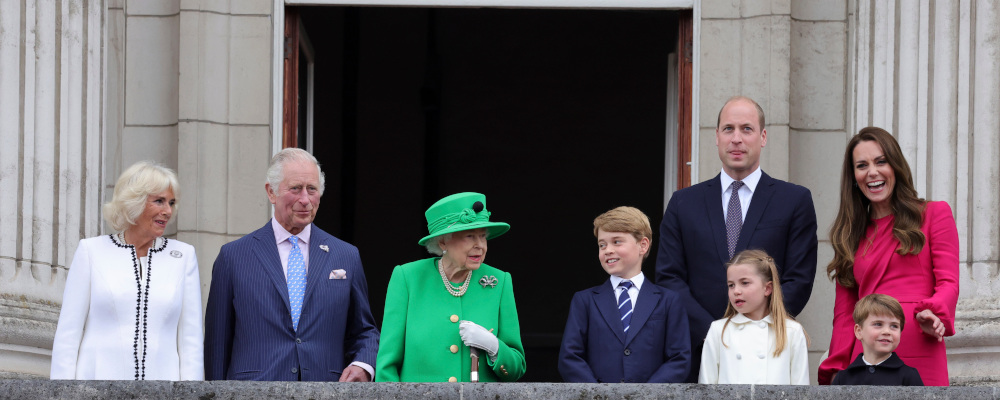Earlier this month, Queen Elizabeth II’s Platinum Jubilee celebrations, with all their pomp and pageantry, marked the occasion of her 70 years on the throne—longer than any British Monarch in history. Her seven decades of dedication represent the fulfillment of a pledge she made in 1947, when she was 21 years old, to serve the Commonwealth and its people for the whole of her life, no matter how long or short it was.
While millions watched in awe, dazzled by the festivities, not all were so captivated. There have been murmurings about the relevance of the Crown here in Canada since our country’s inception. Mostly, Canadians are apathetic at best towards the institution.
Anti-monarchist sentiment has come in waves over the years, and at present seems to be getting stronger, thanks in no small part to recent high-profile royal scandals. Despite the large majority (63 percent) of Canadians having favourable views of Queen Elizabeth II, 51 percent of Canadian say that Canada should not continue as a constitutional monarchy in future generations, according to an Angus Reid Institute poll back in April.
Given that Queen Elizabeth II has just recently turned 96 years old, we must begin to more seriously discuss the role of the monarchy in our country and what the alternative is: constitutional monarchy versus Canadian republicanism.
The Monarchist League of Canada is the staunchest pro-monarchist voice in the country, arguing that the continued presence of the Crown in Canada strengthens national identity and stability and enables the protection of democracy.
Regarding national identity, the argument goes that due to our close proximity with the United States and its overwhelming social and cultural influence, having a distinct political system ensures Canada remains distinct in North America; it is a bulwark against simply becoming a smaller, less impressive clone of our southern neighbour. This may be the weakest argument for constitutional monarchy. It is quite dated in a digitally-connected, globalized world where social and cultural influences from every single society can impact our own, and vice versa.
However, when it comes to democracy and stability, monarchists may have the upper hand. In a republican system like America’s, partisan politics have had a heavy influence on its institutions. The presence of an all-powerful president as its head of state only exacerbates and accelerates the problem of polarization.
Canada, being a parliamentary democracy and constitutional monarchy, has evolved and gone through many transitions over the years since Confederation, particularly in terms of demographics, society, and culture. And polarization is a problem here too. Yet the Crown, at least, remains a stable, and stabilizing, force.
Given that the role of the Crown is to remain non-partisan under the Constitution, it stays above our political fray and acts as a safeguard of democratic institutions and processes with the Governor General, as the representative of the Crown, remaining an independent figure from the prime minister.
No matter who is in government, whether it be the Conservative Party, the Liberal Party, or any other, a non-political and non-partisan head of state is, if nothing else, a unifying figure capable of representing each individual citizen, regardless of their political leanings.
Arguments pointing to the neutered nature of the Crown miss the point. Canada has evolved into the country it has become today where any direct interference of the monarchy is absent from our affairs. Nonetheless, the mere presence of the monarchy should not be taken for granted. Symbolic is not a synonym for useless.
But, regardless of its strengths, the monarchist movement is facing two major challenges: cultural relevance and historical wrongs.
According to a poll from the Angus Reid Institute, half of Canadians (50 percent) don’t see the relevance of the monarchy at all and almost half (49 percent) say that the monarchy represents outdated values that they do not subscribe to.
We cannot talk about constitutional monarchy without addressing historical wrongs the British Crown and its empire perpetrated against not only Indigenous Peoples, Black Canadians, and other communities here in Canada, but against millions of people around the world. And while those occurred in the past, it’s still at the forefront of many communities’ minds as these negative consequences persist to this day.
These sentiments only worsened in the eyes of many when Meghan Markle’s allegations of racism in the Royal Family aired in an interview with Oprah back in March 2021. While some dismissed the interview as insubstantial, many others were not impressed, especially given that 60 to 70 percent of the Commonwealth are people of colour.
Perhaps unsurprisingly, Barbados cut ties to the monarchy in the fall of 2021, becoming a parliamentary republic, and Jamaica, following a very unsuccessful tour by the Duke and Duchess of Cambridge, is moving towards severing its ties to the monarchy as well—moves that a majority of Canadians support. In fact, three-in-five Canadians say that it is the right decision for countries such as Barbados and Jamaica to free themselves from their colonial roots.
The Canadian republican movement seeks to do the same. Citizens for a Canadian Republic states that its main objective is to instill a direct democratic process in choosing a truly Canadian head of state, one who is relevant, is more representative of Canadian society, and is free from our colonial roots.
Yet this movement has some major structural obstacles before it. The Crown is entrenched in our democratic system and institutions. For it to be abolished from the Constitution, it would require the agreement of the House of Commons, the Senate, and the unanimous agreement of each province. Furthermore, a referendum may have to be called, similar to the 1999 republic referendum in Australia.
Also at stake are treaty relations with Indigenous peoples. It is important to recall that treaty relationships are not fulfilled by the elected government but by the Crown. For instance, under the Royal Proclamation of 1763, unceded lands belonged to Indigenous peoples and could not be occupied by non-Indigenous peoples unless bought by the Crown and sold to the general population. This proclamation is the main foundation of Indigenous land rights and the right to self-determination. Treaty rights in Canada were renewed in the Constitution Act of 1982.
Some Indigenous communities are not too keen to remove the Crown from the system, and with good reason. Elected governments come and go. The Crown is constant. While it is a fact that historically treaties and Indigenous rights have not always been respected, it is still a legal foundation that many communities can refer to when it comes to land and cultural rights and claims. If the Crown were to be abolished, the legal status of treaty rights would be up in the air.
Now, some can make the argument that treaties are subjected to international law based on the United Nations Declaration on the Rights of Indigenous Peoples. But international law lacks executive power. The government of Canada is not obligated to legally comply with it.
All told, if Canada wishes to become a republic it will be an uphill battle. Yet many are up for the fight. Amongst Canadians who do want to abolish constitutional monarchy in the country, 92 percent are willing to try to change the constitution to cut ties with the monarchy even if it is difficult.
The Royal Family is fully aware of their tenuous position here in Canada. When Prince Charles visited Canada in May, he acknowledged the importance of reconciliation and emphasized the importance of listening and learning from Canadians directly.
As Canadians, we cannot deny that Queen Elizabeth II’s decades of service did benefit us over the past 70 years, both domestically and internationally. We should not lightly discard the institution that gave us her dutiful service and must reflect on all the monarchy has to offer us, too. We cannot afford to make any drastic changes or decisions without a clear view of all potential consequences.
Recommended for You

‘They’re voting with their eyeballs’: Sean Speer on the revealed preferences of Canadian news consumers

Kirk LaPointe: B.C.’s ferry fiasco is a perfectly Canadian controversy

‘I want to make Canada a freer country’: Conservative MP Andrew Lawton talks being a newbie in Parliament, patriotism, and Pierre Poilievre’s strategy

Michael Kaumeyer: Polite decline: Canada’s aversion to being our best is holding us back




